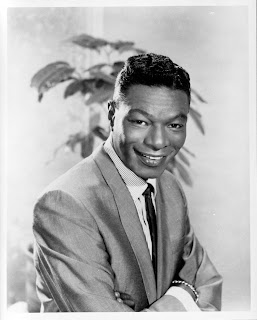The music of Black America: Nat King Cole
>> Thursday, December 4, 2008

Nathaniel Adams Coles (March 17, 1919 – February 15, 1965), known professionally as Nat King Cole, was an American musician who first came to prominence as a leading jazz pianist. Although an accomplished pianist, he owes most of his popular musical fame to his soft baritone voice, which he used to perform in big band and jazz genres. He was the first black American to host a television variety show and has maintained worldwide popularity over 40 years past his death; he is widely considered one of the most important musical personalities in United States history.
The family lived in the Bronzeville neighborhood of Chicago. Nat would sneak out of the house and hang outside the clubs, listening to artists such as Louis Armstrong, Earl "Fatha" Hines, and Jimmie Noone. He participated in Walter Dyett's renowned music program at DuSable High School.
Inspired by the playing of Earl Hines, Cole began his performing career in the mid-1930s while he was still a teenager, adopting the name "Nat Cole." His older brother, Eddie Coles, a bassist, soon joined Nat's band, and the brothers made their first recording in 1936 under Eddie's name. They were also regular performers at clubs. In fact, Nat got his nickname "King" performing at one jazz club, a nickname presumably reinforced by the otherwise-unrelated nursery rhyme about Old King Cole. He was also a pianist in a national touring revival of ragtime and Broadway theatre legend Eubie Blake's revue, "Shuffle Along." When it suddenly failed in Long Beach, California, Cole decided to remain there.
Cole's first mainstream vocal hit was his 1943 recording of one of his compositions, "Straighten Up and Fly Right," based on a black folk tale that his father had used as a theme for a sermon. Johnny Mercer invited him to record it for the fledgling Capitol Records label. It sold over 500,000 copies, and proved that folk-based material could appeal to a wide audience. Although Nat would never be considered a rocker, the song can be seen as anticipating the first rock and roll records. Indeed, Bo Diddley, who performed similar transformations of folk material, counted Cole as an influence.
On November 5, 1956, "The Nat King Cole Show" debuted on NBC-TV. While commentators have often mistakenly hailed Cole as the first African-American to host a network television show, an honor belonging to jazz pianist and singer Hazel Scott in 1950, the Cole program was the first of its kind hosted by a star of Nat Cole's magnitude.
It initially began as a 15-minute show on Monday night, the program was expanded to a half hour in July 1957. Despite the efforts of NBC, as well as many of Cole's industry colleagues—many of whom, such as Ella Fitzgerald, Harry Belafonte, Mel Tormé, Peggy Lee and Eartha Kitt worked for industry scale in order to help the show save money—The Nat King Cole Show was ultimately done in by lack of a national sponsorship. Companies such as Rheingold Beer assumed regional sponsorship of the show, but a national sponsor never appeared.
The TV show was ultimately canceled because potential sponsors shied away from showcasing a black artist. Cole fought racism all his life and refused to perform in segregated venues. In 1956, he was assaulted on stage during a concert in Birmingham, Alabama (while singing the song "Little Girl") by three members of the North Alabama White Citizens' Council (a group led by Education of Little Tree author Asa "Forrest" Carter, himself not among the attackers), who apparently were attempting to kidnap him. The three male attackers ran down the aisles of the auditorium, towards Cole and his band. Although local law enforcement quickly ended the invasion of the stage, the ensuing "melée" toppled Cole from his piano bench and injured his back. Cole did not finish the concert and never again performed in the South. A fourth member of the group who had participated in the plot was later arrested in connection with the act. All were later tried and convicted for their roles in the crime.
Cole, a smoker of three packs of cigarettes a day, died of lung cancer on February 15, 1965. Valentine's Day, the day before he died, he did a radio interview, stating: "I am feeling better than ever. I think I've finally got this cancer licked."
Information source: Wikipedia




























3 comments:
I love my Nat King Cole Christmas album. He has such a timeless, smooth and friendly sound, doesn't he?
Great post.
Cole is my fav male vocalist ever.
Great, effortless-like phrasing.
Then comes Frank, Dean, Der Bingle, and Louis, to top out The 5.
My very favorite singer! I remember his TV show and his voice lile velvet! And my favorite love song his rendition of "When I Fall in Love". It defines true love for me. They don't make 'em like Nat anymore!
Post a Comment